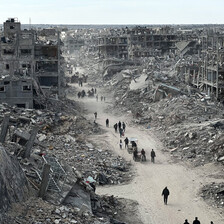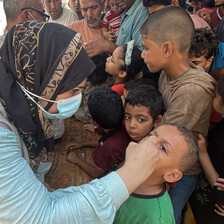The Electronic Intifada 22 April 2024

A mass grave has been found at Nasser Medical Complex in Khan Younis, southern Gaza.
APA imagesReem Omar is worried about the health of her family. Two of her four children have contracted hepatitis.
The first sign of infection came when Reem noticed that her daughter’s face had turned a sickly shade of yellow.
After a few days, her daughter – who had become quite thin – had a high temperature and diarrhea and started to vomit.
Reem initially sought help from a medical point. Its workers felt a more thorough examination was necessary and told Reem that her daughter should be taken to the Kuwaiti hospital in Rafah, Gaza’s southernmost city.
Hepatitis A is closely associated with poor diet and a lack of clean water.
Reem is convinced that the scarcity of food in Gaza caused her children to become ill. “There are no fruit or healthy sources of nutrition that help children and adults to fight diseases,” she said.
Following mass displacement, more than 1 million people remain crammed into Rafah despite reports that some have recently left the city.
Jamal al-Hams, a doctor at the Kuwaiti hospital, noted that displaced people are “living in very difficult conditions” and “there is no protection from viruses and epidemics.”
“We used to receive 100 patients a day in this small and simple hospital,” he added. “Today we are talking about receiving 1,000 or more patients with infectious diseases during a single day, not to mention the many cases of injuries because of the ongoing war on Gaza.”
The few remaining hospitals in Gaza are overwhelmed. Israel has been attacking the healthcare system without mercy.
The World Health Organization has described the situation as “heartbreaking.”
Among the sites targeted are al-Shifa, Gaza’s largest hospital. Last month, Israel carried out one of the worst massacres in Palestinian history there.Within the past few days, a mass grave has been found at Nasser Medical Complex in Khan Younis, southern Gaza. It contained at least 180 bodies.
Unless a ceasefire is called, it appears certain that Gaza’s hospitals and medical workers will be subjected to further attacks, that disease will spread and that more people will die from conditions that are both preventable and curable.
Fedaa al-Qedra is a journalist in Gaza.





